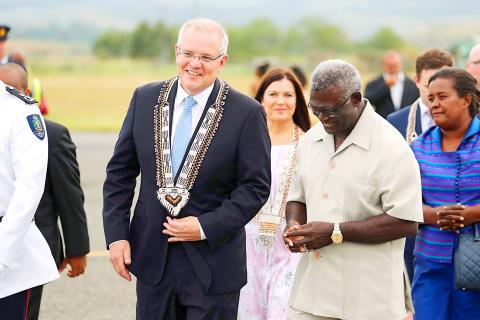Australian Prime Minister Scott Morrison arrived in the Solomon Islands yesterday, the first visit by an Australian leader in more than a decade as Western nations seek to rein in China’s influence in the Pacific.
The trip comes as the US and its regional allies try to ensure that Pacific nations with diplomatic links to Taiwan do not sever those in favor of ties with Beijing.
The Solomon Islands is one of six Pacific countries to recognize Taiwan, a policy now in question after recent elections.

Photo: AFP / Adam Taylor / Australian Prime Minister’s Office
Morrison flew into Honiara on his first overseas trip since winning re-election last month.
He did not make any public comments on arrival, but has said the visit will show Australia’s commitment to the region.
“The Pacific is front and center of Australia’s strategic outlook,” he said in a statement last week.
Morrison’s trip comes just a few days before a visit to the Solomon Islands by New Zealand Deputy Prime Minister Winston Peters, who is also to travel to Vanuatu this week.
Keen to undercut China’s Belt and Road Initiative, Australia has directed ever-larger amounts of its foreign aid to the Pacific.
It has offered Pacific countries up to A$3 billion (US$2.1 billion) in grants and loans to build infrastructure, as Morrison declared the region was “our patch.”
Canberra last year said it would spend A$139 million to develop undersea Internet cable links to Papua New Guinea and the Solomon Islands, amid national security concerns about Chinese telecom Huawei Technologies Co (華為).
Australia became the first country to ban Huawei’s gear from its nascent broadband network, a step the US followed this year by effectively banning US firms from doing business with Huawei.
The issue of climate change, which has at times strained Australia’s relationship with its Pacific neighbors, is likely to feature prominently during the visit, Australian broadcaster SBS News said yesterday.
Solomon Islands lawmaker Peter Kenilorea Jr said he wanted Australia to show “stronger leadership” on climate change, SBS News journalist Pablo Vinales said in a tweet yesterday.

OPTIMISTIC: The DGBAS sharply upgraded its GDP growth estimate from 3.54 percent to 7.71 percent after the Taiwan-US trade agreement signing and given AI optimism The US imported more from Taiwan than China for the first time in decades, as US President Donald Trump’s tariffs reshape trade flows while a global boom in artificial intelligence (AI) fuels demand for tech products. US purchases of goods from China plunged almost 44 percent in December last year from 2024 to US$21.1 billion, US Department of Commerce data showed on Thursday. By contrast, shipments from Taiwan more than doubled during the same period to US$24.7 billion. The soaring Taiwanese shipments to the US reflect the huge expansion in supplies of chips and servers for AI companies, which has completely changed

The Central Election Commission has amended election and recall regulations to require elected office candidates to provide proof that they have no Chinese citizenship, a Cabinet report said. The commission on Oct. 29 last year revised the Measures for the Permission of Family-based Residence, Long-term Residence and Settlement of People from the Mainland Area in the Taiwan Area (大陸地區人民在台灣地區依親居留長期居留或定居許可辦法), the Executive Yuan said in a report it submitted to the legislature for review. The revision requires Chinese citizens applying for permanent residency to submit notarial documents showing that they have lost their Chinese household record and have renounced — or have never

US and Chinese fighter jets briefly faced off above waters near the Korean Peninsula this week, Yonhap News agency reported, marking a rare confrontation in that area between the two superpowers. About 10 US fighter jets on Wednesday departed an airbase in Pyeongtaek, South Korea, for drills above international waters off South Korea’s western coast, the news outlet cited unidentified military sources as saying. While the US planes did not enter China’s air defense identification zone, Beijing scrambled planes as they neared that region, the report said. “The Chinese People’s Liberation Army organized naval and air forces to monitor and effectively respond

Taiwan has secured another breakthrough in fruit exports, with jujubes, dragon fruit and lychees approved for shipment to the EU, the Ministry of Agriculture said yesterday. The Animal and Plant Health Inspection Agency on Thursday received formal notification of the approval from the EU, the ministry said, adding that the decision was expected to expand Taiwanese fruit producers’ access to high-end European markets. Taiwan exported 126 tonnes of lychees last year, valued at US$1.48 million, with Japan accounting for 102 tonnes. Other export destinations included New Zealand, Hong Kong, the US and Australia, ministry data showed. Jujube exports totaled 103 tonnes, valued at